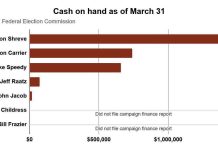Three months after Jim Lienhoop’s primary victory against Mayor Kristen Brown, positioning the city council member to become Columbus’ 37th mayor, it’s unclear whether factions within the local Republican Party will be able to resolve their differences.
Lienhoop, who won with 63 percent of the vote and faces no opposition from a Democrat or independent in the November general election, and Bartholomew County Chairwoman Barb Hackman, who supported Lienhoop when he announced his intentions last November, said some hard feelings remain but that she doesn’t think the party is split.
Hackman said she has seen signs that the local Republican Party will remain vibrant, such as new faces asking about running for office and strong attendance — 250 to hear Indiana House Speaker Brian Bosma in April — at the party’s Lincoln Day Dinner.
Lienhoop also said he thinks the sides will be able to move forward together.
[sc:text-divider text-divider-title=”Story continues below gallery” ]
“I’m pretty optimistic. I think things will work out fine,” Lienhoop said.
Some of Brown’s supporters are less convinced relations will improve, however.
Hackman’s support upset Brown and some backers of the incumbent mayor, and bitterness lingers.
“I would say the Republican Party in Bartholomew County is far from united, to put it mildly,” said Tim McIver, who was Brown’s campaign treasurer.
Brown declined to be interviewed for this story.
“I don’t know if fences can be mended,” said Ken Fudge, who also voted for Brown. He said the candidates’ philosophies of leading the city are just too far apart.
Deep divisions
Brown and Lienhoop came into the primary election with contrasting ideas on how best to govern the city.
The mayor and city council also have disagreed on spending issues, funding for the Columbus Area Arts Council and the powers of the mayor over the Columbus Parks and Recreation Department, for example.
The most recent divide between the council and mayor is over building a downtown Riverwalk to connect People Trails segments, something the mayor supports. The council did not act on the measure when it was presented at last week’s meeting.
McIver said he’s never seen so much antagonism between a Republican council and Republican mayor.
Both sides also complained about social media posts that they said were misleading and painted each other in a negative light.
McIver referenced a post-election Facebook post equating the mayor to an evil movie character and rejoicing in her defeat.
Hackman referenced a Facebook post by the mayor that said Lienhoop and Clerk-Treasuer Luann Welmer had broken the law through their involvements with Columbus Downtown Inc.
“It’s inappropriate and not very professional,” Hackman said.
McIver and Fudge said Brown and her supporters probably feel a sense of disenfranchisement from the Republican Party.
‘It goes both ways’
Brown swept into office as a political outsider four years ago, winning the 2011 Republican primary with 60 percent of the vote and garnering 67 percent in the general election. While in office, Fudge said, Brown brought a different style of leadership, one that caused people used to the old ways to oppose her.
While McIver and Fudge talked of disenfranchisement, Hackman referenced a lack of engagement with the Bartholomew County Republican Party by Brown, candidates who challenged city council incumbents and Brown supporters.
“There were very few times she (Brown) was in attendance at our political functions or supported the party. Some things that were said on social media were derogatory about the party, so I don’t feel like she has supported the party,” Hackman said. “It goes both ways.”
Hackman added that most of the Republican council candidates who challenged the incumbents never contacted her before filings, usually done as a common courtesy. The only one who did, she said, was Russ Poling, who was unsuccessful against Frank Jerome for the District 3 council seat.
Poling declined to be interviewed for this story.
The divide between the camps was apparent on Election Night as Brown conducted her own results-watching party at a location different from the local Republican Party. Several council challengers also attended Brown’s party.
Hackman said she’s never known that to happen before. She said all candidates were invited to the GOP’s party at the Clarion Hotel and Conference Center.
“I felt that was unfortunate, but that was their choice,” Hackman said.
No rules on support
However, McIver said Hackman’s open support of Lienhoop also was unfortunate and disappointing.
McIver noted that when he ran for mayor in 1995 and faced an opponent in the Republican primary, the GOP Central Committee took a neutral stance on the candidates. He said Hackman should have done the same in this case.
Hackman, who donated $200 to Lienhoop’s campaign, said she received a social media message from the mayor calling her support of Lienhoop corrosive to the Republican Party. Hackman said she personally supported him for mayor because she had known him for a long time and had worked with him at the church they both attend.
“I knew his character very well. When he made his announcement to run for mayor, I wanted to support him,” Hackman said, adding that because she doesn’t live in the city she couldn’t cast a vote for him in the election.
Lienhoop announced his mayoral bid in November. Hackman said that until Brown announced her re-election bid in January, she had no idea if the mayor would seek a second term.
No rules or state party directive exists about whether a county chairperson should support candidates in primary elections, Hackman said. She added that she knows of some counties where the chair remains neutral and others where the chair has supported candidates over others.
Hackman said she’s had conversations with some Brown supporters who contacted her and wanted to know why she openly supported Lienhoop. For the most part, their comments were cordial, she said.
“I had one come into my office. I know he supported Kristen. He came in and said, ‘Hey, we’re going forward and we’re behind the party and we’ll support the people elected.’”
Hackman said she also was contacted by Poling because he wanted to understand her decision.
“I’ve talked to him since. We’re friends. He had no hard feelings,” Hackman said. “I know where he stood, and that’s how it should be.”
Reconciliation efforts
During Lienhoop’s victory speech, he told supporters of the need to reach out to Brown’s backers and include them, because Columbus is still their community.
“The main thing we want her supporters to understand is that we’re sincere when we talk about trying to include them in government going forward,” Lienhoop said.
Lienhoop said he’s asked some of his supporters who he knows have friends among Brown’s group of backers to reach out to them.
They asked the mayor’s supporters to give Lienhoop a chance and wait and see how things unfold before forming further opinions.
The message that has come back, Lienhoop said, is to make sure he invites new people to help his administration, such as on boards and commissions, instead of going back to the same people who are often asked to serve.
“We’re going to be mindful of trying to broaden the pool of people we ask to serve. We want to reach out in a number of different directions, not just to people of my generation,” Lienhoop said.
Brown’s supporters also noted in their responses some programs the mayor was integral in starting and that they would like to keep, such as curbside recycling and greater transparency efforts, Lienhoop said.
“We don’t intend to take any step backwards in any of those. Some of the neighborhood revitalization efforts — there were a lot of good things that happened in the last 3½ years, and we don’t intend to turn away from any of that,” Lienhoop said.
After the primary, McIver said he was contacted by someone from Lienhoop’s camp to discuss mending relations, and they talked in his office. However, McIver said he wished the conversation had taken place before the primary to discuss problems.
Actions more than words will be important if relations are to be mended, he said.
“That will go a long way toward putting things together,” McIver said.
One action that McIver said would be helpful is for Lienhoop’s camp to quit acting as if he’s already the mayor.
Lienhoop is assured of becoming the next mayor because the Democrats didn’t field a mayoral candidate, and no independent filed by the deadline. Nevertheless, the general election is still about three months away, McIver said.
“The coronation has already started. Let’s throttle it a bit. I understand people are excited, but if you are really concerned about the other side, put a sock in it or do it with some decorum, don’t put it in their face,” McIver said.
Lienhoop said that down the line he would ask Brown for some time to arrange the transition.
“I’m sure there are many conversations as mayor that she has that don’t reach out to the public realm. I’ll ask to be brought up to speed on that, no different than any other transition in office,” Lienhoop said.
Any communication between the two would reflect a change, Lienhoop said.
The two have not talked since Lienhoop’s primary election victory, he said.




